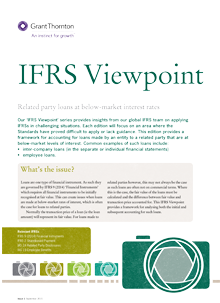-
Valuations
For organisations involved in a transaction, dispute, merger, acquisition or restructuring, the value of the company involved and its assets will be an important…
-
Due diligence
Due diligence identifies risks and examines potential financial, tax, legal or operational pitfalls. We offer robust due diligence services, clearly tailored to our clients'…
-
Independent trusted advice
Do you want to sell your business or rather grow it through an acquisition?
-
Corporate reorganisations
Redesigning your group structure can mean significant cost savings and/or efficiency improvements. The restructuring provisions of the Companies and…
-
Legal support
Mergers and acquisitions represent a challenge for dynamic organisations. As a manager or entrepreneur, you want to look at this challenge from all sides to…

-
Transfer pricing
Our experts help document your transfer pricing principles, intra company transactions and internal…
-
Global mobility services
International employment has become a standard practice in today's HR policies. Nevertheless, it…
-
International tax & VAT
If your business has grown internationally or if you’re considering to take the step to…
-
IFRS reporting
IFRS reporting services for international groups and SMEs.
-
Financial statement audit
As a large organisation, you are required by law to appoint an auditor to report to the general meeting on…
-
Agreed upon procedures
As an entrepreneur or manager, you may entrust specific work to your company auditor. The nature,…
-
IFRS reporting
The European International Financial Reporting Standards (IFRS) have been mandatory for listed…
-
Legal assignments
When significant events occur, the Companies Act imposes audit and reporting obligations on your…
-
Transaction advisory services
As independent advisers, our transaction specialists offer independent advice, not just on the…
-
Restructuring
Based on our "to-the-point" analyses, we identify with you the appropriate restructuring opportunities to help…
-
Internal audit
An effective internal audit function helps dynamic organisations better manage risks and turn them into…
-
Risk and compliance management
What are the risks to my business? What steps should I take to avoid these risks? Our business-risk…
-
Data analytics & process mining
Companies have a huge amount of data at their disposal, and that amount of information is also…
-
Process optimisation and internal controls
Futureproof organisations need to regularly revisit their strategies and objectives thereby optimizing their…
-
ESG Consulting
Get to work on sustainability with Grant Thornton’s assistance. Choose our concrete, tailor-made solutions…
-
Cyber risk services
Cybersecurity and data privacy threats evolve on a daily basis. It is essential to recognize the threats,…
-
Forensic & integrity
Fraudsters become more inventive and can adopt different strategies depending on their target’s…
-
Whistleblow services
A whistleblowing programme helps your organisation to both prevent and detect fraud quickly. That way,…
-
Corporate tax
Laws on taxation are dynamic. Making sure your organization’s liabilities are met, requires constant monitoring and managing. Our advisers can offer…
-
VAT
This requires a high level of experience, knowledge and insight of indirect tax, but also of your industry and organisation. Our team of full-time VAT specialists can…
-
International tax & VAT
If your business has grown internationally or if you’re considering to take the step to expand abroad, you want to continue maximizing your efforts. Where domestic…
-
Compensation & benefits
To recruit and retain the best talent, it is essential to offer optimised and competitive pay packages. Grant Thornton helps you put together attractive packages tailored to…
-
Transfer pricing
Our experts help document your transfer pricing principles, intra company transactions and internal reporting and organisation. They design and implement…
-
Global mobility services
In a globalised world, businesses must work seamlessly across borders. Organisations operate in multiple countries and view international expansion as a…
-
Private client services
Our solutions include dealing with emigration and tax mitigation on the income and capital growth of overseas assets.

-
Legal support & contracts
Running your business on a day-to- day basis often has legal consequences. Not only key…
-
Company law & acquisitions
Your organisation is accountable towards many stakeholders: shareholders, board members,…
-
Labour and social security law
Belgian labour and social security legislation is a maze of schemes and regulations that employers tend to…
-
IT law & GDPR
Every business depends on ICT support. Given the business-critical nature of many ICT applications,…
-
Legal Counsel as a Service
Does your company need a 100% committed 'specialised' generalist who really knows the ins and outs…
-
Commercial Toolbox Check by Grant Thornton
A commercial toolbox is a collection of essential documents and templates that businesses use to…
-
Accounting & reporting
At Grant Thornton, we offer you our accounting services either on a fully outsourced basis or a co-sourced…
-
CFO-as-a-service
Are you a dynamic SME and do you want to be able to fall back on the expertise of a CFO? But is a…
-
Outsourcing
Your financial information is an important management tool. That is why it is important your entire…
-
Consolidation
Our experts have a broad practical experience in consolidation. The methodology that we apply,…
-
Global Compliance and Reporting Solutions
As an entrepreneur operating in different countries, you are often confronted with various local…
-
Values and business culture
Our values guide us globally in the right direction to support our clients and ensure our own evolution, both…
-
Flexibility and work-life balance
Flexibility and responsibility are our core values, both at work and beyond. So you can be ambitious…
-
Client portfolio
We learn and grow together with our customers. That is why you get a varied customer portfolio with…
-
International network
With 62,000 colleagues in over 140 countries, we are one of the largest accountancy and advisory firms…
-
Inclusive business culture
Whatever your experience, background, race, diploma, gender or orientation, you are welcome!…
Our 'IFRS Viewpoint' series provides insights from our global IFRS team on applying IFRSs in challenging situations. Each issue will focus on an area where the Standards have proved difficult to apply or lack guidance. This issue provides a framework for accounting for loans made by an entity to a related party that are at below-market levels of interest. Common examples of such loans include:
- inter-company loans (in the separate or individual financial statements)
- employee loans.
Loans are one type of financial instrument. As such they are governed by IFRS 9 (2014) 'Financial Instruments' which requires all financial instruments to be initially recognised at fair value. This can create issues when loans are made at below-market rates of interest, which is often the case for loans to related parties.
Normally the transaction price of a loan (ie the loan amount) will represent its fair value. For loans made to related parties however, this may not always be the case as such loans are often not on commercial terms. Where this is the case, the fair value of the loans must be calculated and the difference between fair value and transaction price accounted for. This IFRS Viewpoint provides a framework for analysing both the initial and subsequent accounting for such loans.
Our view
Where related party loans are made on normal commercial terms, no specific accounting issues arise and the fair value at inception will usually equal the loan amount.
Where a loan is not on normal commercial terms however, the 'below-market' element of the transaction needs to be evaluated and separately accounted for.

The diagramme illustrates the framework we believe should be applied in analysing such questions. The first step is to determine whether the loan is on normal commercial terms. If it is not, the 'below-market' part indicates that part of the transaction price is for something other than the financial instrument and should therefore be accounted for independently from the residual amount of the loan receivable or payable. This separate element should be accounted for under the most relevant Standard. For example, in the case of a loan to an employee that pays interest at a rate less than the market rate, the difference between the loan amount and fair value is, in substance an employee benefit that should be accounted for under IAS 19.
Where the 'below-market' element of the loan is not directly addressed by a Standard, reference should be made to the IASB's Conceptual Framework for Financial Reporting (the Conceptual Framework) in determining the appropriate accounting. For example, for reasons we will explain, in the case of a loan from a parent to a subsidiary that pays interest at less than the market rate, the difference between the loan amount and the fair value (discount or premium) will typically be recorded as
- an investment in the parent's separate financial statements (as a component of the overall investment in the subsidiary)
- a component of equity in the subsidiary's individual financial statements (sometimes referred to as a 'capital contribution').
Having separately accounted for this element of the loan, the remaining loan receivable or payable should be accounted for under IFRS 9. IFRS 9 sets out the classification and measurement requirements for the loan receivable or payable as well as the impairment requirements for the receivable.
Review the attached pdf for more analysis and examples.
Read full report



